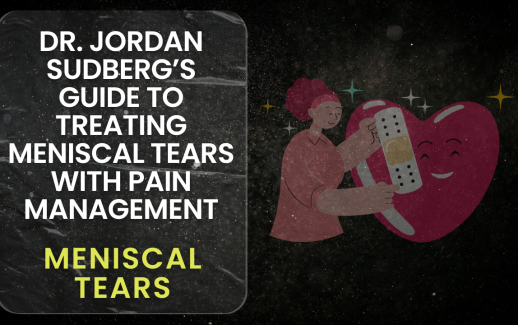Inside the Role: What Dr. Jordan Sudberg Does as a Pain Management Specialist
Pain is a universal experience—but chronic pain is a different story. It can dominate a person’s life, limit mobility, interfere with work and relationships, and lead to emotional distress. That’s where pain management specialists step in. These highly trained medical professionals don’t just treat pain—they work to understand it, address its root causes, and restore a patient’s quality of life.
Among the leaders in this vital field is Dr. Jordan Sudberg, a board-certified pain management specialist known for his patient-centered, multidisciplinary approach. With a background in physical medicine and rehabilitation, Dr. Sudberg blends traditional and cutting-edge techniques to help patients navigate complex pain conditions.
In this blog post, we’ll explore what a pain management specialist does, how they differ from other medical professionals, and why experts like Dr. Sudberg are playing an increasingly important role in modern healthcare.
Defining the Role: What Is a Pain Management Specialist?
A pain management specialist is a physician with advanced training in diagnosing and treating all types of pain, especially chronic pain that persists for weeks, months, or even years. This includes pain from injuries, surgery, nerve damage, spinal issues, arthritis, and conditions like fibromyalgia.
“Pain is not just a symptom—it’s a condition in its own right,” says Dr. Jordan Sudberg. “Effective treatment requires a deep understanding of the body, the nervous system, and the unique experience of each patient.”
Unlike general practitioners, pain specialists focus exclusively on evaluating the complex interplay between physical, emotional, and neurological factors that contribute to ongoing pain.
Conditions Treated by Dr. Jordan Sudberg
Pain management specialists like Dr. Jordan Sudberg treat a wide range of conditions, including:
- Back and neck pain
- Herniated discs
- Sciatica
- Post-surgical pain
- Joint and musculoskeletal pain
- Neuropathic pain (e.g., from diabetes or shingles)
- Complex regional pain syndrome (CRPS)
- Sports injuries
- Headaches and migraines
- Work-related and repetitive stress injuries
What sets Dr. Sudberg apart is his holistic, personalized approach, often combining medical treatments with lifestyle strategies to improve outcomes and minimize dependence on medications.
Diagnostic Expertise: Getting to the Root of the Pain
Accurately diagnosing the cause of pain is the first step toward effective treatment. Dr. Sudberg uses a variety of tools to determine what’s truly going on beneath the surface:
- Comprehensive patient interviews
- Physical examinations
- Imaging studies (X-rays, MRIs, CT scans)
- Nerve conduction studies
- Functional assessments
“Two patients can report the same type of pain, but the underlying causes—and the right treatments—can be completely different,” Dr. Sudberg notes.
This diagnostic process enables him to tailor treatment plans that are safe, targeted, and aligned with the patient’s goals.
Treatment Options Offered by Dr. Sudberg
Pain management involves much more than just prescribing pills. Dr. Jordan Sudberg uses a range of interventional and non-interventional treatments, including:
1. Interventional Procedures
- Epidural steroid injections
- Nerve blocks
- Radiofrequency ablation
- Joint injections
- Spinal cord stimulation
These procedures can reduce inflammation, block pain signals, and restore function with minimal recovery time.
2. Medication Management
When necessary, medications may be used strategically to manage pain. Dr. Sudberg prioritizes non-opioid alternatives and works closely with patients to minimize dependency and monitor effectiveness.
3. Physical Rehabilitation
Movement and exercise are integral to recovery. With his background in physical medicine, Dr. Sudberg often coordinates physical therapy programs tailored to improve strength, flexibility, and body mechanics.
4. Lifestyle and Holistic Therapies
Stress reduction, nutrition, sleep optimization, and ergonomic education all play a role in pain relief. Dr. Sudberg frequently incorporates:
- Mindfulness and meditation
- Anti-inflammatory diet guidance
- Behavioral therapy referrals
- Patient education resources
“Pain affects every aspect of life—and that means our approach must address the whole person, not just the injury,” he emphasizes.
Why See a Pain Management Specialist Like Dr. Sudberg?
People often come to pain management specialists after months or years of frustration—when treatments have failed or their pain has been dismissed. Dr. Jordan Sudberg aims to change that narrative by providing compassionate, science-backed care that puts the patient in control.
Seeing a specialist like Dr. Sudberg can help patients:
- Receive a proper diagnosis
- Explore advanced, minimally invasive treatments
- Reduce reliance on medications
- Improve mobility and function
- Regain confidence in their body
- Restore quality of life
A Final Word from Dr. Jordan Sudberg: Empowerment Through Understanding
For Dr. Jordan Sudberg, pain management is not just about suppressing symptoms—it’s about empowering people to reclaim their lives.
“When patients understand their pain, they stop fearing it. And when they have a voice in their care, they begin to heal not just physically, but emotionally,” he says.
Whether you’re recovering from an injury, managing a chronic condition, or seeking a second opinion, a consultation with a pain management expert like Dr. Sudberg can be the first step toward lasting relief and renewed hope.

